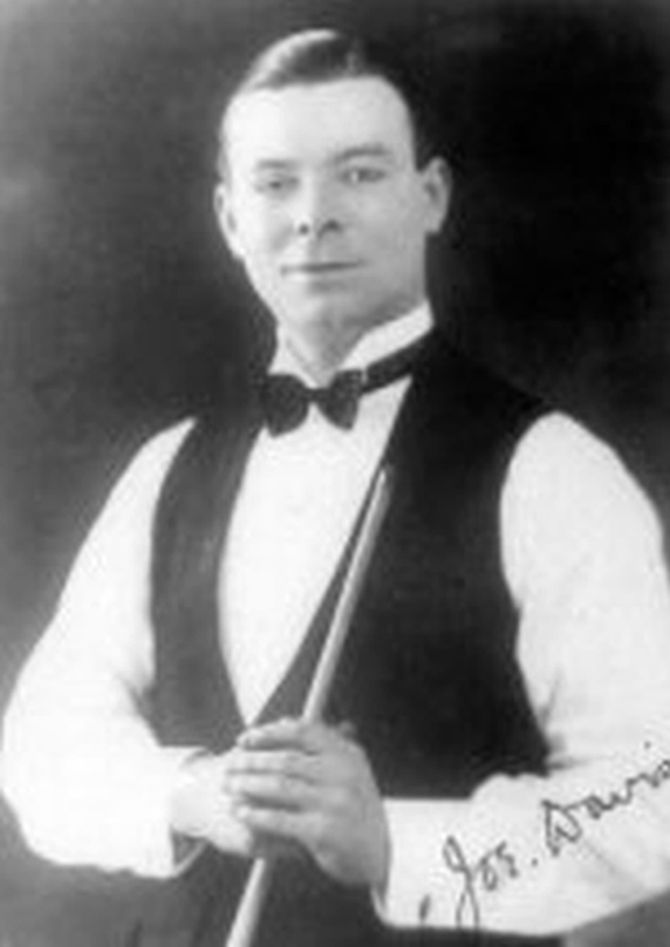
The legendary Joe Davis.

The legendary Joe Davis.
There is a saying that proficiency at snooker is the sign of a misspent youth. Whether or not like American pool halls, snooker halls have or deserve a bad reputation, the professional game has always been free of any sort of corruption at both the highest levels and lower down.
It is therefore both sad and remarkable in equal measure that Stephen Lee was recently found guilty of match-fixing. What — barring a successful appeal — is likely to be the final chapter of Lee’s snooker career was played out today when the game’s ruling body slapped a 12 year ban on him at its Bristol headquarters.
Commenting earlier this month, fellow professional Judd Trump said anyone convicted of match-fixing should be banned for life.
Another professional, Mark King, said Lee had been let off lightly, but snooker is a young man’s game; if and when he does return to the green baize, Lee will be 50, and realistically there will be no way back, even if he continues to practise in the meantime.
Snooker has had its “bad boys” in the past, but nothing like this. The game itself was invented in Imperial India by Colonel Sir Neville Chamberlain and others. Originally called snookers’ pool, it is an off-shoot of a game called pink pool. Snooker is played on a billiards table — not a snooker table — and came about because billiards, which is played with only three balls, can become boring at the higher levels, and is certainly not a spectator sport. A snooker was originally a first year cadet at the Woolwich Military Academy.
Although the rules were first formalised in 1884, the first world professional championship was not held until 1927 when it was won by the legendary Joe Davis, who is still arguably the greatest player of all time. Davis won the title 15 times in a row – over 20 years allowing for the Second World War hiatus. He set a trend because up until very recently the world title has been dominated by individuals. To date, only 23 men have ever won the game’s most prestigious title, and all but three of them have come from the British Isles. All this could soon be changing as China with its massive, snooker mad population and a large crop of budding professionals makes its impression felt.
One thing that won’t change though is the game’s sky high standards. A search of the Times Digital Archive reveals an allegation of match-fixing in 1998, and precious little in the way of bad behaviour before that. True, there were the antics of Mr Higgins, which included on one occasion urinating in a pot plant. Then there was the young Canadian professional Kirk Stevens. Talented, charismatic and incredibly good looking with it. Shame about the cocaine.
And that is about it. If professional snooker has always been the cleanest game in town, there is a good reason for that, historically. When Joe Davis won the inaugural title, he pocketed a cheque for £6 10s. Last year, Ronnie O’Sullivan picked up a cool £250,000 for winning the title at the home of snooker, Sheffield’s Crucible Theatre.
What little corruption there may be in snooker is related to big money, as is usually the case, but the good news is that so far this has been purely through match-fixing on relatively small events. This is not a new story, because big money taints everything it touches unless measures are put in place to combat it; fortunately, the ruling body of world snooker is second to none. Since its inception in 1968, the WPBSA has ensured that all officials as well as players maintain the highest professional standards. Unlike other games and sports — soccer is the obvious one — any minor infraction of the rules or unsportsmanlike conduct is dealt with promptly and effectively, Ronnie O’Sullivan can vouch for that.
Although the Stephen Lee affair is the most serious scandal ever to affect the world of professional snooker, it appears to have been confined to Lee and at most a handful of others. We can be sure that it will be a long time before something like it happens again; the Draconian penalty meted out to Lee — in effect a lifetime ban — will ensure that any player tempted to fix a match in future will do the math and realise it doesn’t add up. Lee himself will undoubtedly spend the next twelve years wondering why he didn’t do the same.
[The above article was first published September 25, 2013.]
Back To Digital Journal Index